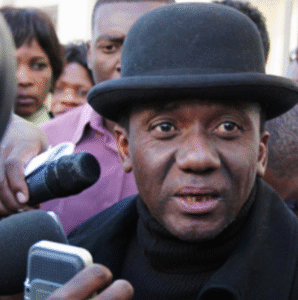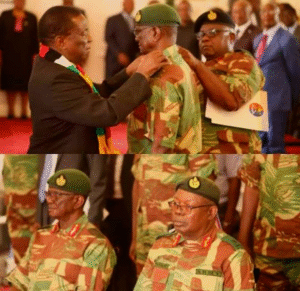STEPHEN MUTAMBA: A SYMBOL OF ZANU PF’S IRON GRIP ON ZIMBABWE

The appointment of Stephen Mutamba as the new police commissioner-general is a clear sign of how the Zanu PF regime continues to tighten its grip on Zimbabwe. For years, it has been an open secret that President Emmerson Mnangagwa favored Mutamba for this role. This move is not about competence or public service but about cementing control over state institutions to suppress dissent.
Mutamba is a known ally of Mnangagwa, and his rise within the police force has been carefully orchestrated. He replaces Tandabantu Godwin Matanga, who served as a placeholder since 19 December 2017. Matanga’s tenure was only meant to be temporary, but like many things in this regime, it dragged on for far too long. Even as Mutamba is named the new commissioner-general, Matanga will continue to oversee the police until 31 December 2024, creating a bizarre dual leadership situation.
Matanga’s time in office began in the aftermath of the 2017 coup that removed Robert Mugabe. Augustine Chihuri, the former commissioner-general, was ousted, and Matanga stepped in to secure Mnangagwa’s regime. Matanga’s long career in the police, dating back to 1982, may have seemed impressive on paper, but his leadership failed to bring meaningful reforms to a police force riddled with corruption and brutality.
Stephen Mutamba, however, represents something far worse—a deepening of state repression. His career path within the police force shows how loyalty to the regime outweighs merit. In 2019, he was reassigned from Crime to Operations, a role that gave him more power. By 2021, he was moved to Administration, further solidifying his position as Mnangagwa’s trusted enforcer.
Mutamba’s name is not only tied to Mnangagwa but also to serious allegations of undermining democracy. In 2022, the United States imposed sanctions on him for his role in suppressing opposition parties and civil society. The US accused Mutamba of using state security forces to intimidate and harass political opponents of the ruling Zanu PF. During the COVID-19 pandemic, he was accused of enforcing curfews selectively, allowing Zanu PF activities to continue freely while silencing opposition voices.
The accusations do not stop there. Mutamba allegedly pushed for vote tallies to be hidden from the public during elections and worked to block international observers from monitoring Zimbabwe’s polls. These actions have eroded any remaining trust in the fairness of Zimbabwe’s electoral system.
His appointment sends a clear message: the regime is not interested in reform or democracy. Instead, it seeks to tighten its stranglehold on power through intimidation and suppression. The police, under Mutamba’s leadership, will likely become even more of a tool for crushing dissent.
This is not a moment to celebrate new leadership in the police force. It is a moment to reflect on how far Zimbabwe has fallen under Mnangagwa’s rule. Institutions meant to serve the people have become weapons against them. The police force, which should protect citizens, has been turned into an extension of Zanu PF’s political machinery.
Mutamba’s rise is a reminder that the fight for democracy in Zimbabwe is far from over. Activists, opposition leaders, and ordinary citizens must brace themselves for tougher times ahead. The regime is clearly doubling down on its efforts to silence any challenge to its rule.
As we approach future elections, Zimbabweans must remain vigilant. The international community must also take note of how the regime continues to erode democratic freedoms. Sanctions alone will not stop this rot. What Zimbabwe needs is coordinated pressure and unwavering support for those fighting for change on the ground.
Mutamba’s appointment is not about leadership; it is about control. It is about using the police to protect the interests of a corrupt elite while ordinary citizens suffer. This is the reality of Mnangagwa’s Zimbabwe—a nation held hostage by those who claim to lead it.




